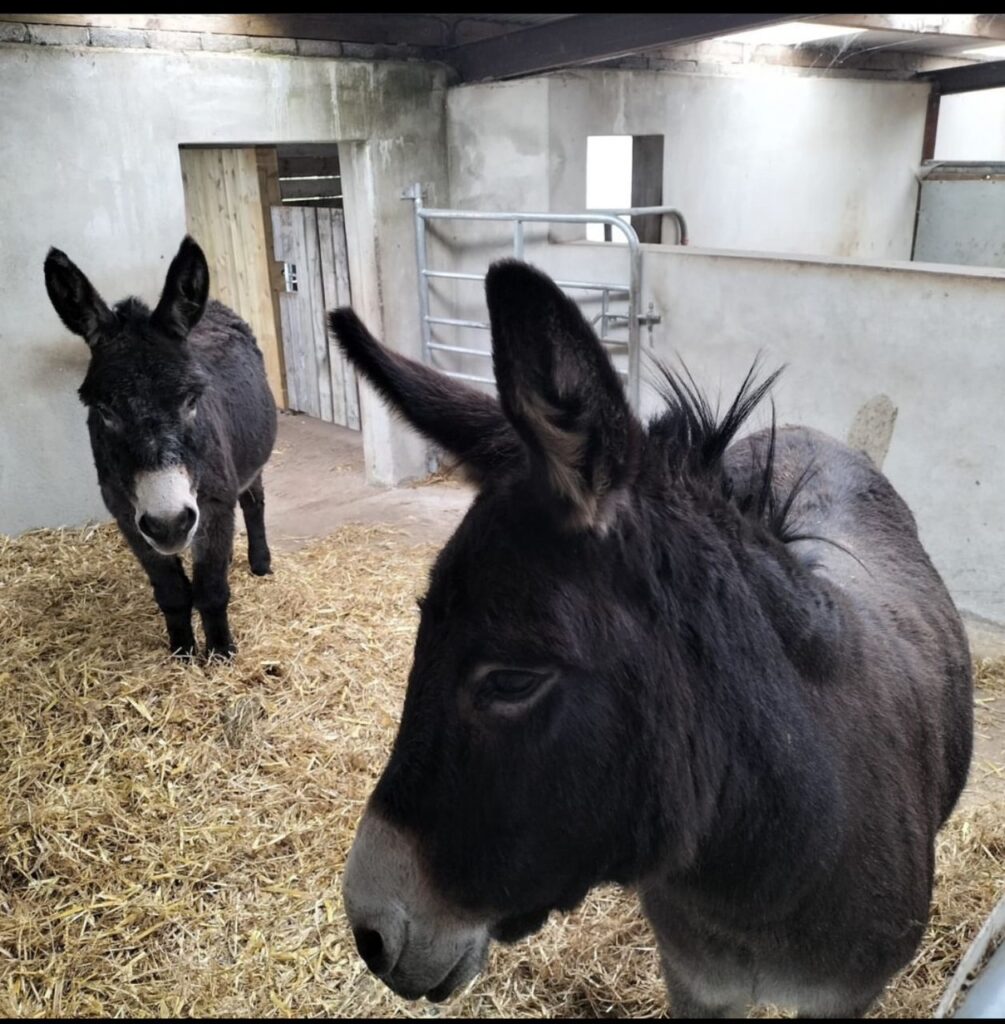Welcome to Pasture Donkeys! We’re thrilled to help you embark on your journey as a donkey owner. Donkeys are wonderful, intelligent, and affectionate animals that can bring joy and companionship into your life. Proper care is essential to ensure they thrive in their new environment. This guide covers everything you need to know about caring for your donkey, from diet and housing to health and training.

Understanding Donkey Behavior
Donkeys are social animals with distinct behaviors and communication methods. Recognizing these behaviors will help you build a strong bond with your donkey.
Common Donkey Behaviors:
- Braying: Donkeys bray to communicate with their herd and alert you to their needs.
- Ear Positioning: Ears forward indicate interest, while flattened ears can signal anger or discomfort.
- Body Language: A relaxed donkey will have a calm demeanor, while tension or agitation may indicate fear or discomfort.
2. Creating a Suitable Living Environment
A comfortable and safe living environment is crucial for your donkey’s well-being.
Shelter:
- Provide a sturdy, weatherproof shelter to protect your donkey from extreme weather conditions.
- Ensure good ventilation and a dry, clean floor.
Pasture:
- A spacious pasture with plenty of grass is ideal. Donkeys require at least 0.5 to 1 acre per donkey.
- Ensure the pasture is free of toxic plants and has secure fencing to prevent escapes.
3. Nutrition and Feeding
Proper nutrition is vital for your donkey’s health. Donkeys have specific dietary needs that differ from other livestock.
Diet:
- Forage: The majority of a donkey’s diet should consist of high-fiber forage, such as hay or grass. Avoid feeding them lush, rich grass, which can cause obesity and laminitis.
- Supplements: Depending on their diet and workload, your donkey might need additional supplements. Consult with a veterinarian for specific recommendations.
Feeding Tips:
- Provide fresh water at all times.
- Feed small, frequent meals to mimic their natural grazing behavior.
- Avoid sugary treats and high-starch foods.
4. Health Care and Maintenance
Regular health care is essential to keep your donkey in top condition.
Veterinary Care:
- Schedule regular check-ups with a veterinarian experienced in donkey care.
- Keep up with vaccinations, deworming, and dental care.
Hoof Care:
- Trim your donkey’s hooves every 6-8 weeks to prevent overgrowth and associated health issues.
- Regularly inspect hooves for signs of injury or infection.
Grooming:
- Brush your donkey regularly to remove dirt and debris, and to check for parasites.
- Bathing is generally not necessary, but spot cleaning can be done as needed.
5. Training and Enrichment
Donkeys are intelligent and enjoy mental stimulation and training.
Training Tips:
- Use positive reinforcement, such as treats and praise, to encourage good behavior.
- Be patient and consistent; donkeys respond well to gentle, steady training.
Enrichment:
- Provide toys, such as balls and puzzle feeders, to keep your donkey mentally engaged.
- Spend time interacting with your donkey daily to build a strong bond and provide social stimulation.
6. Social Needs and Companionship
Donkeys are herd animals and thrive with companionship.
Companionship:
- Consider keeping more than one donkey, or provide companionship with other animals such as horses or goats.
- Ensure that any companion animals are compatible and safe to be around your donkey.
Interaction:
- Spend time with your donkey each day to build trust and provide social interaction.
- Engage in activities such as grooming, walking, and training to strengthen your bond.
7. Common Health Issues
Being aware of common health issues can help you catch and address problems early.
Colic: Gastrointestinal distress that requires immediate veterinary attention. Laminitis: Inflammation of the hoof, often caused by poor diet or obesity. Parasites: Regular deworming and pasture management can help prevent infestations. Dental Issues: Regular dental check-ups are essential to prevent and address problems.
Conclusion
Caring for a donkey is a rewarding experience that requires commitment and knowledge. By providing proper nutrition, a suitable living environment, regular health care, and plenty of social interaction and enrichment, you can ensure your donkey leads a happy and healthy life. At Pasture Donkeys, we’re here to support you every step of the way. Feel free to reach out with any questions or for further advice. Welcome to the wonderful world of donkey ownership!


